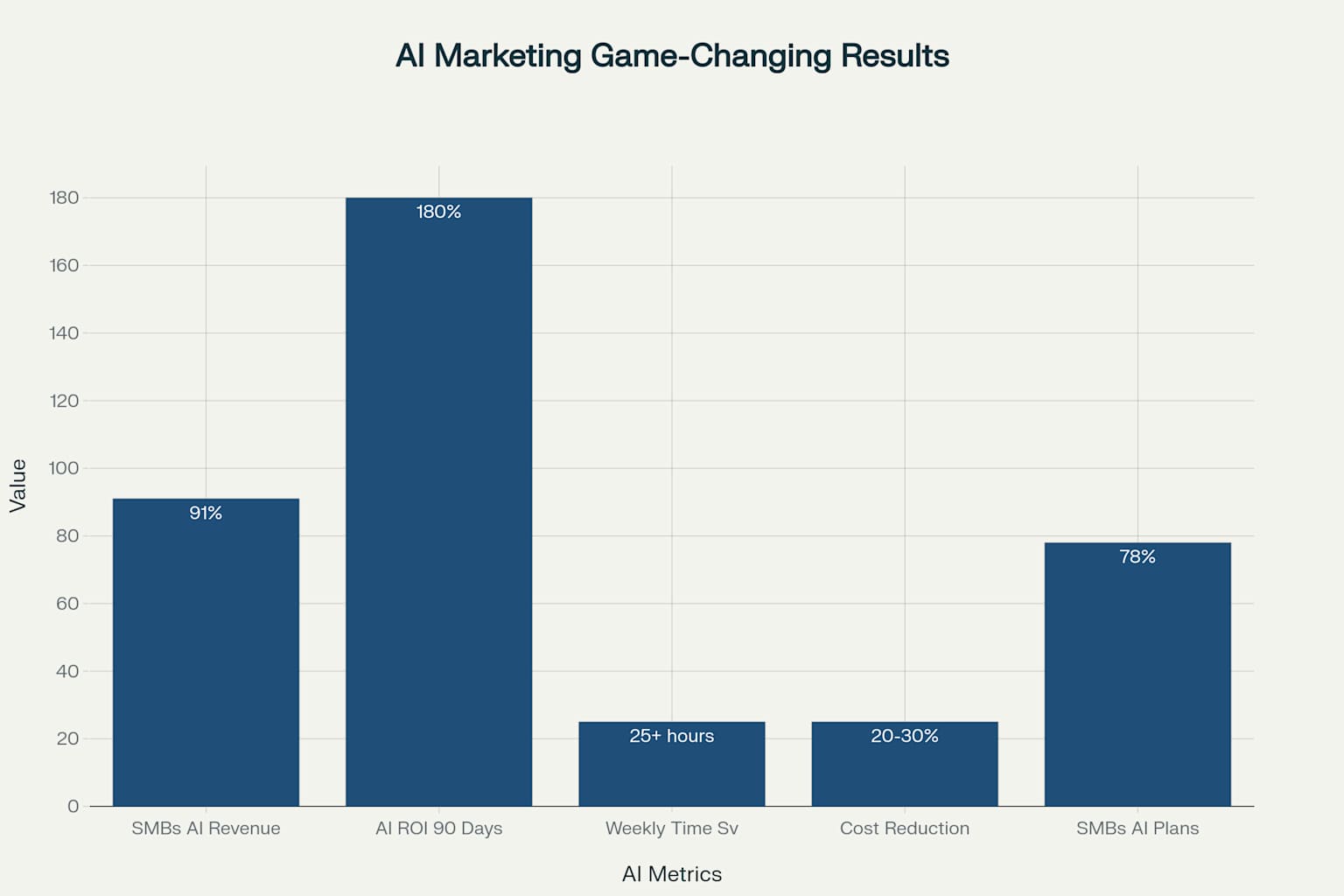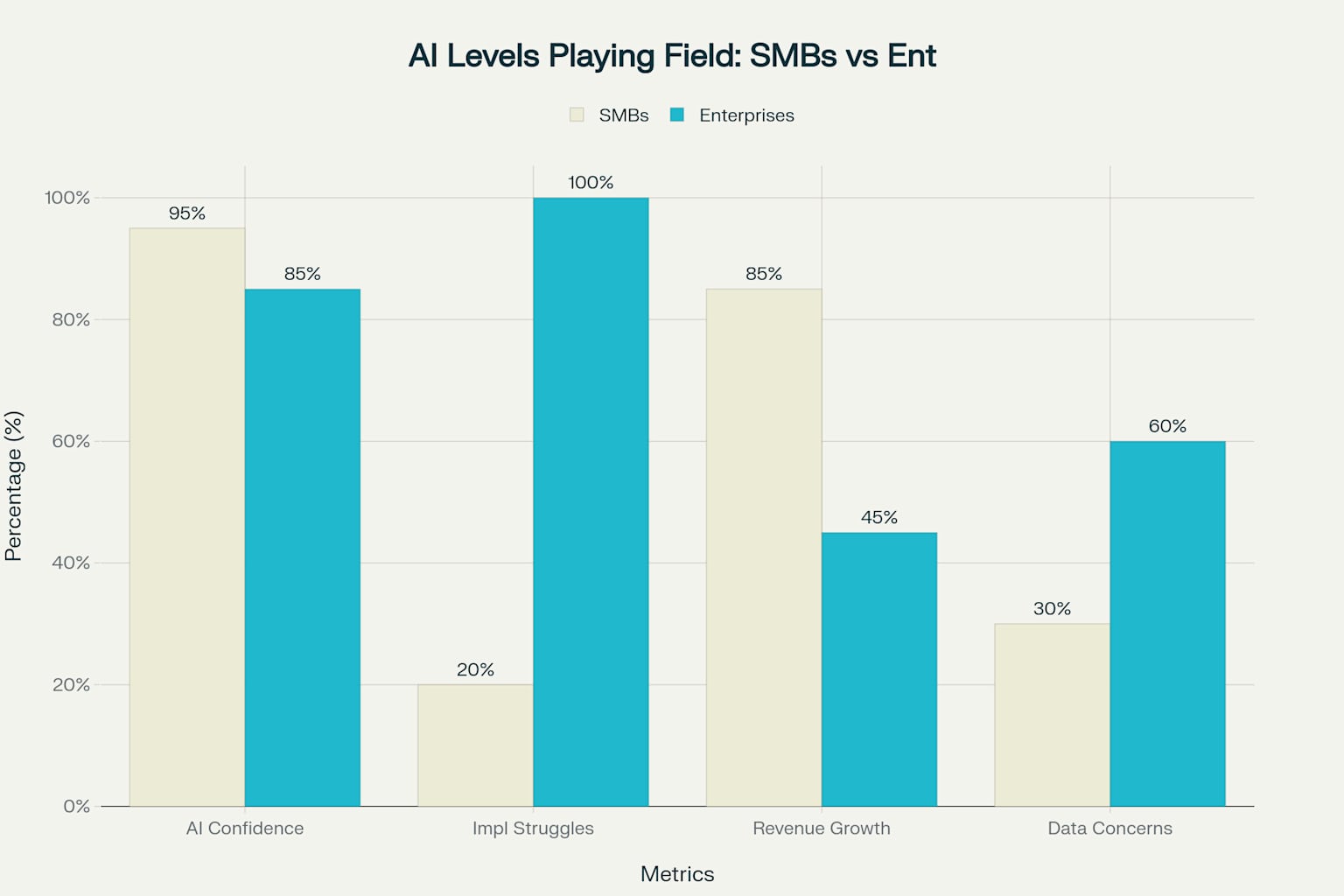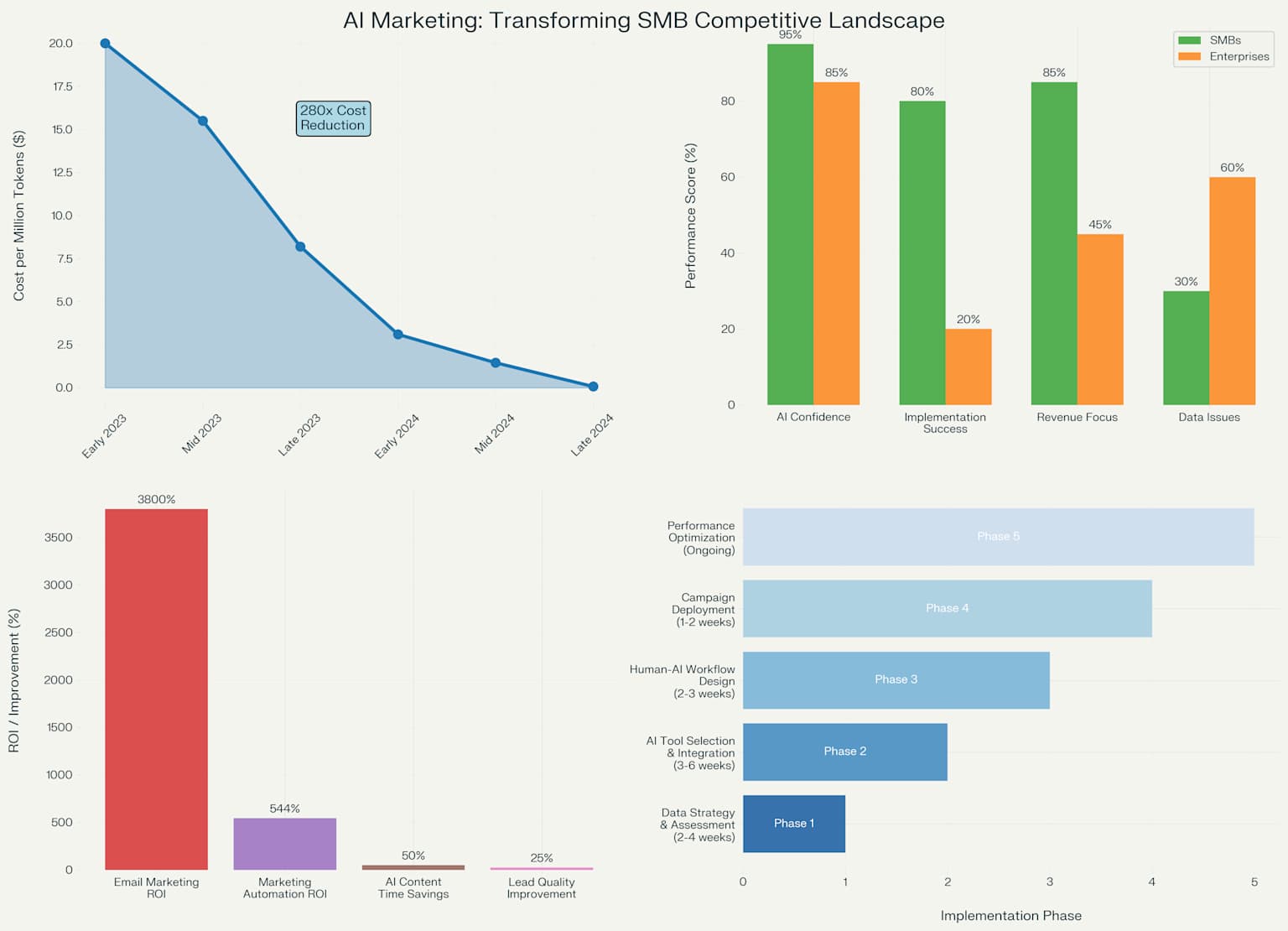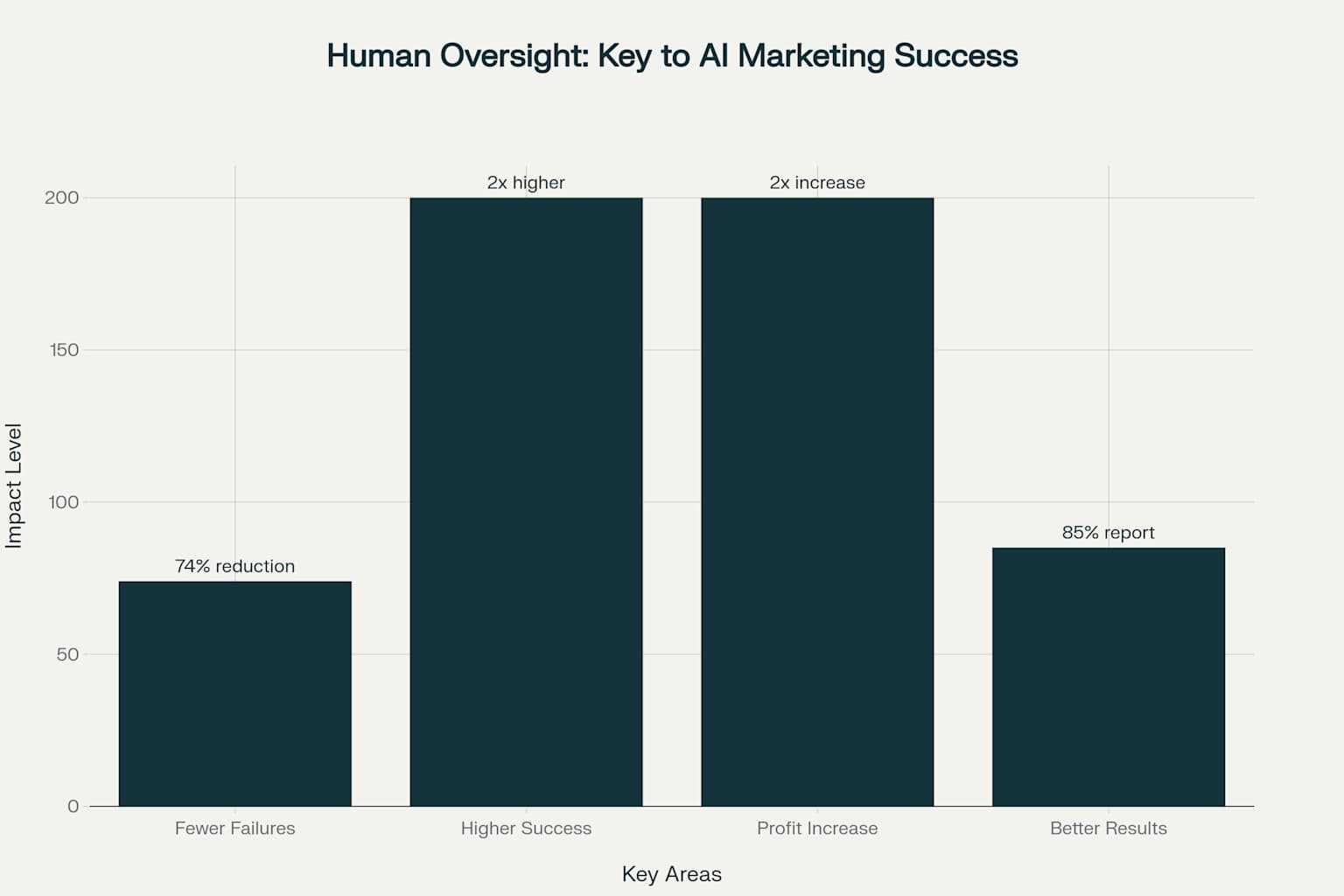The AmpliVibe Platform: How Small Businesses Can Outperform National Brands
Research reveals that 91% of SMBs using AI report revenue increases, while AI costs have plummeted 280 times in just 18 months, fundamentally democratizing access to enterprise-grade marketing capabilities.


Small and medium-sized businesses are experiencing a revolutionary shift in their ability to compete with enterprise-level competitors. Research reveals that 91% of SMBs using AI report revenue increases, while AI costs have plummeted 280 times in just 18 months, fundamentally democratizing access to enterprise-grade marketing capabilities. The AmpliVibe Platform represents a strategic framework that transforms this technological accessibility into sustainable competitive advantage, enabling SMBs to achieve more marketing output, maintain cost efficiency, preserve essential human oversight, and deliver superior ROI compared to traditional approaches.
The SMB Marketing Challenge: David vs. Goliath in the Digital Age
Small businesses have historically operated at a significant disadvantage when competing against national brands and large enterprises. Traditional marketing required substantial budgets for advertising, extensive teams for content creation, and sophisticated infrastructure for customer relationship management. 73% of SMBs report lacking confidence in their marketing strategy, while 55% identify customer acquisition as their primary challenge.
The economic pressures facing small businesses have intensified these challenges. With 81% of SMBs expressing concerns about economic impact on their operations, the need for cost-effective marketing solutions that deliver measurable results has never been more critical. However, the emergence of AI-powered marketing automation presents an unprecedented opportunity to level this playing field.
The Resource Gap
Large enterprises have traditionally dominated through several key advantages:
- Budget Scale: National brands deploy millions in advertising spend across multiple channels simultaneously
- Team Expertise: Dedicated specialists for each marketing function, from data analysis to creative development
- Technology Infrastructure: Enterprise-grade tools and platforms requiring significant upfront investment
- Market Research Capabilities: Extensive consumer insights and behavioral analytics resources
These advantages created seemingly insurmountable barriers for SMBs attempting to compete for the same customers and market share.

AI as the Great Equalizer: Transforming SMB Competitive Dynamics
The democratization of AI technology has fundamentally altered the competitive landscape. What once required teams of specialists and massive infrastructure investments can now be accomplished through intelligent automation accessible to businesses of any size. AI costs have dropped from $20.00 to just $0.07 per million tokens, representing a 280-fold reduction that makes enterprise-level capabilities affordable for SMB budgets.
This cost reduction has practical implications across every aspect of marketing operations:
- Content Creation: AI tools reduce content production time by 50% while saving up to 40% on costs
- Campaign Management: Real-time optimization and audience targeting previously requiring dedicated teams
- Data Analysis: Advanced analytics and predictive insights accessible through user-friendly interfaces
- Personalization: Individual customer journey customization at scale
SMBs Outperforming Enterprises
Contrary to conventional wisdom, research demonstrates that small businesses are actually outperforming large enterprises in AI adoption and implementation. 95% of SMB IT professionals express confidence in AI capabilities, compared to lower confidence levels among enterprise teams. This confidence translates into practical advantages:
Implementation Agility: SMBs demonstrate 5 times fewer struggles with AI implementation compared to enterprises, which often face complex legacy systems and bureaucratic approval processes.
Strategic Focus: 85% of SMBs using AI focus on revenue growth, while enterprises typically prioritize operational efficiency over growth initiatives.

Decision Speed: Smaller organizational structures enable faster testing, iteration, and deployment of AI solutions.
The AmpliVibe Platform Framework: Structured Success for SMBs
The AmpliVibe Platform operates on the principle that successful AI marketing implementation requires more than just technology adoption—it demands a strategic, phased approach that maintains human oversight while maximizing automation benefits. This framework addresses the specific needs and constraints of SMBs while delivering enterprise-level results.
The platform emphasizes four core benefits that directly address SMB competitive challenges:
- Amplified Marketing Output: Enable small teams to produce volume and sophistication comparable to large marketing departments
- Cost Optimization: Achieve same or better results with reduced overall marketing investment
- Human-Centric Automation: Maintain quality control and brand authenticity through strategic human oversight
- Measurable ROI: Deliver quantifiable improvements in lead generation, conversion rates, and customer acquisition costs
The Five-Phase Implementation Strategy
The AmpliVibe Platform follows a proven implementation methodology designed to minimize risk while maximizing impact:
Phase 1: Data Strategy & Assessment (2-4 weeks)
Establishing the foundation for AI-driven marketing success through comprehensive data audit and quality improvement. This phase ensures that automation systems have access to clean, organized, and strategically relevant information.
Phase 2: AI Tool Selection & Integration (3-6 weeks)
Strategic selection and deployment of cost-effective AI tools that integrate seamlessly with existing business systems. Focus on platforms that provide immediate value while scaling with business growth.
Phase 3: Human-AI Workflow Design (2-3 weeks)
Development of human oversight protocols that ensure quality control while maintaining automation efficiency. This critical phase addresses concerns about AI-generated content quality and brand consistency.
Phase 4: Automated Campaign Deployment (1-2 weeks)
Launch of AI-driven marketing campaigns with built-in optimization and real-time performance monitoring. Emphasis on campaigns that demonstrate quick wins while building toward long-term strategic objectives.
Phase 5: Performance Monitoring & Optimization (Ongoing)
Continuous improvement through data-driven insights and iterative refinement. This phase ensures sustained competitive advantage through evolving AI capabilities.
Cost Reduction and Accessibility: The Economic Case for AI Marketing
The dramatic reduction in AI implementation costs has created an unprecedented opportunity for SMBs to access capabilities previously reserved for enterprise-level organizations. AI marketing tools are saving companies an average of $1,000 annually, with 28% reporting savings over $5,000. These cost reductions extend across multiple operational areas:
Infrastructure Optimization: AI-driven resource management can reduce infrastructure costs by up to 74% through intelligent automation and predictive maintenance.
Content Production: Automated content creation delivers 50% time savings while reducing production costs by up to 40%.
Campaign Management: AI-powered ad buying systems achieve 20-30% improvements in ROI through real-time bidding optimization and audience targeting.
Customer Support: Intelligent chatbots handle routine inquiries, reducing support costs by up to 50% while improving response times.
ROI Acceleration
Marketing automation platforms demonstrate exceptional return on investment, with 51% of organizations experiencing ROI greater than 10%, and 22% achieving ROI exceeding 22%. The most successful implementations report even more dramatic results, with top performers achieving ROI increases exceeding 4,700%.
These returns stem from multiple value creation mechanisms:
- Lead Quality Improvement: AI-driven lead scoring and nurturing increases conversion rates by identifying and prioritizing high-value prospects
- Campaign Efficiency: Automated optimization reduces wasted ad spend while improving targeting accuracy
- Customer Lifetime Value: Personalized customer journeys increase retention and repeat purchase behavior
- Operational Efficiency: Automation eliminates manual tasks, allowing teams to focus on strategic initiatives

Human Oversight: The Critical Success Factor
The Human-AI Partnership Model
While AI automation provides significant advantages, the most successful implementations maintain strategic human oversight throughout the marketing process. Companies with human oversight experience 74% fewer AI-related failures and achieve 2x higher profits from AI initiatives compared to organizations relying solely on automated systems.
The AmpliVibe Platform emphasizes "human-in-the-loop" processes that leverage the strengths of both human creativity and AI efficiency:
Strategic Planning: Humans define campaign objectives, brand positioning, and target audience strategies while AI executes tactical implementation.
Content Quality Control: AI generates content variations and suggestions while humans ensure brand consistency, accuracy, and emotional resonance.
Performance Analysis: AI provides real-time data and pattern recognition while humans interpret results and make strategic adjustments.
Risk Management: Human oversight prevents potential issues such as bias in targeting, inappropriate content generation, or brand misalignment.
Building Trust Through Transparency
85% of marketers using human-AI collaboration report better results compared to purely automated or manual approaches. This success stems from the ability to combine AI's data processing capabilities with human judgment and contextual understanding.
The human oversight component addresses common concerns about AI marketing:
- Quality Assurance: Human review ensures content meets brand standards and customer expectations
- Ethical Compliance: Human judgment prevents potential bias or inappropriate messaging
- Brand Authenticity: Human creativity maintains the authentic voice and personality that builds customer relationships
- Strategic Adaptation: Human insight enables rapid response to market changes and customer feedback

Competitive Advantages: How SMBs Outperform National Brands
Speed and Agility
SMBs possess inherent advantages that, when combined with AI capabilities, create significant competitive differentiation:
Decision Speed: Small organizations can implement new strategies and technologies faster than large enterprises with complex approval processes and legacy system constraints.
Market Responsiveness: AI-powered analytics enable SMBs to identify and respond to market trends before larger competitors can adapt their more rigid organizational structures.
Customer Intimacy: Automated personalization allows SMBs to maintain the personal touch that differentiates them from national brands while scaling that intimacy across larger customer bases.
Resource Multiplication
The AmpliVibe Platform enables small teams to achieve output comparable to much larger marketing departments:
Content Scaling: A single marketer can create and manage content campaigns across multiple channels simultaneously through AI assistance.
Multi-Channel Coordination: Automated campaign management ensures consistent messaging across email, social media, advertising, and website experiences.
Real-Time Optimization: AI continuously improves campaign performance without requiring constant manual intervention.
Personalization at Scale
AI enables SMBs to deliver personalized experiences that often exceed what larger organizations provide:
Individual Customer Journeys: Automated workflows create unique experiences for each customer based on their behavior and preferences.
Dynamic Content: AI generates personalized email content, product recommendations, and website experiences in real-time.
Predictive Engagement: Machine learning identifies optimal timing and messaging for each customer interaction.
Implementation Strategy: Getting Started with AmpliVibe
Readiness Assessment
Successful implementation begins with honest assessment of current capabilities and realistic goal setting:
Current State Analysis: Evaluate existing marketing processes, technology infrastructure, and team capabilities to identify automation opportunities and potential obstacles.
Resource Planning: Determine available budget, time, and personnel for implementation while establishing realistic timelines and expectations.
Goal Definition: Establish specific, measurable objectives that align with overall business strategy and growth targets.
Phased Deployment Approach
The AmpliVibe Platform recommends starting with high-impact, low-risk automation opportunities before expanding to more complex implementations:
Quick Wins: Begin with email automation, social media scheduling, and basic lead scoring to demonstrate immediate value and build confidence.
Process Integration: Gradually incorporate AI into existing workflows rather than replacing entire systems simultaneously.
Capability Building: Invest in team training and skill development to maximize platform utilization and ensure long-term success.
Measuring Success
Effective measurement requires tracking both quantitative metrics and qualitative improvements:
Financial Metrics: Monitor cost per acquisition, customer lifetime value, marketing ROI, and revenue attribution to automation efforts.
Operational Metrics: Track time savings, process efficiency improvements, and team productivity gains.
Customer Metrics: Measure engagement rates, conversion improvements, and customer satisfaction scores.
The Future of SMB Marketing: Sustained Competitive Advantage
Evolutionary Advantage
SMBs that successfully implement AI marketing frameworks like AmpliVibe establish sustainable competitive advantages that compound over time:
Learning Acceleration: AI systems continuously improve performance through data accumulation and algorithmic refinement.
Market Position: Early AI adopters establish market leadership positions that become increasingly difficult for competitors to challenge.
Customer Relationships: Enhanced personalization and responsiveness build stronger customer loyalty and higher lifetime values.
Scaling Opportunities
The AmpliVibe Platform provides a foundation for growth that scales with business expansion:
Geographic Expansion: Automated systems enable entry into new markets without proportional increases in marketing costs.
Product Diversification: AI-driven customer insights facilitate development and marketing of new product offerings.
Channel Integration: Automated workflows support expansion across new marketing channels and customer touchpoints.
Conclusion
The AmpliVibe Platform represents more than a marketing automation solution—it embodies a strategic framework that transforms small businesses into formidable competitors capable of challenging national brands on equal footing. Through the intelligent combination of AI automation and human oversight, SMBs can achieve greater marketing output, reduced costs, maintained quality control, and superior ROI compared to traditional approaches.
The evidence overwhelmingly supports the transformative potential of AI marketing for small businesses. With 91% of SMBs using AI reporting revenue increases and AI costs reduced by 280 times, the accessibility barrier that once prevented small businesses from competing with large enterprises has been eliminated. The question is no longer whether SMBs can afford to implement AI marketing, but whether they can afford not to.
The AmpliVibe Platform provides the structured, proven methodology for capturing these benefits while avoiding common implementation pitfalls. By following the five-phase framework and maintaining strategic human oversight, SMBs can not only compete with national players but often outperform them through superior agility, personalization, and customer responsiveness.
The competitive landscape is shifting dramatically, and small businesses equipped with the right AI marketing framework are positioned to lead that transformation. The AmpliVibe Platform offers the roadmap for SMBs ready to amplify their marketing capabilities and establish sustainable competitive advantages in an AI-driven marketplace.

.jpeg)